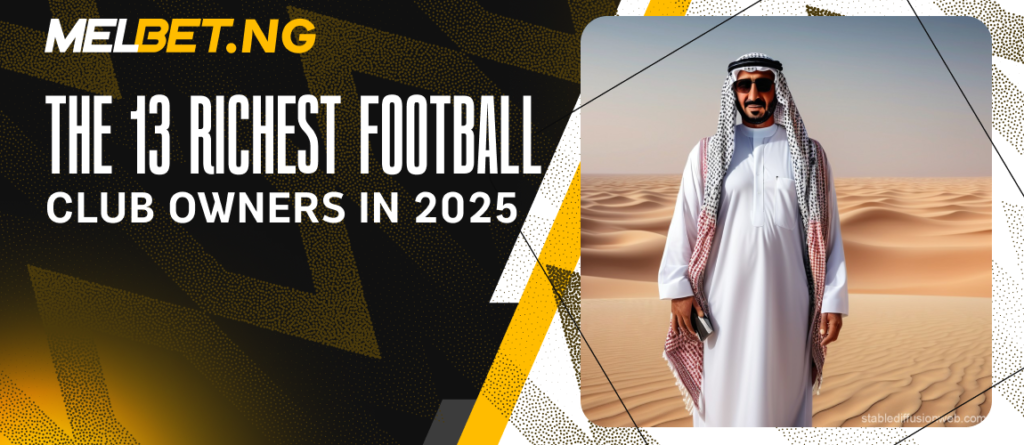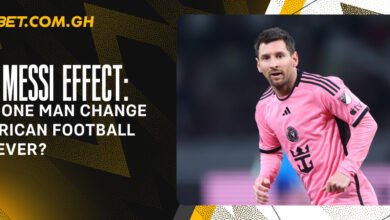The 13 Richest Football Club Owners in 2025

Football in 2025 is more than just a sport — it has become a battleground for global wealth and influence. Across Europe, the United States, and the Middle East, ultra-wealthy investors and powerful sovereign wealth funds are transforming football from the highest levels, redefining how the sport is run and funded. Stadiums have turned into symbols of financial muscle, and club crests are now valuable assets in billion-dollar portfolios. From luxury fashion tycoons to hedge fund managers and oil-rich monarchs, the ownership landscape is more powerful and polarizing than ever. In this high-stakes contest, each club is a chess piece in a global financial strategy. This article explores the richest football club owners in the world right now and how their wealth is transforming the sport.
In the middle of this shift, Melbet Nigeria continues to attract attention from fans looking to make the most of their football instincts. Keep reading until the end to uncover a special Melbet ng promo code that increases your welcome bonus when signing up.
The Bottom of the Top – Owners with Billions but No Trophies Yet
Despite their immense financial backing, not every club owned by billionaires has managed to translate investment into trophies. Across Europe and beyond, several wealthy owners are still waiting for their teams to lift major silverware — proving that success in football isn’t always guaranteed by a big bank balance.
Nassef Sawiris (Aston Villa)
The Egyptian businessman is one of the wealthiest individuals in Africa, with his fortune primarily stemming from the construction and chemical sectors. Since partnering with American businessman Wes Edens to secure a controlling stake in Aston Villa, Nassef Sawiris has brought significant financial backing and a clear vision for long-term growth. His involvement has not only stabilized the club but also fueled its resurgence, signaling a strong commitment to restoring Villa’s competitive stature in both domestic and European football. While trophies have yet to arrive, Aston Villa is now a consistent Premier League presence with growing European ambitions.
François-Henri Pinault (Stade Rennais)
Best known as the CEO of Kering, the fashion giant that owns brands like Gucci and Saint Laurent, Pinault took control of Stade Rennais through his family’s holding company. Although Stade Rennais is not traditionally considered a French powerhouse, Pinault’s backing has turned them into a competitive Ligue 1 outfit with an eye on long-term development.
Dietmar Hopp (TSG Hoffenheim)
As the co-founder of SAP, Hopp has long been a significant figure in German football. His involvement with Hoffenheim, his hometown club, has helped it climb from the lower leagues to the Bundesliga. Despite criticism over the club’s rapid rise and structure, Hopp remains committed to sustainable growth rather than instant glory.
Big Spenders, Bigger Ambitions – Owners Pushing for Silverware
Joe Lewis (Tottenham Hotspur)
Joe Lewis, through his investment group ENIC, has been involved with Tottenham Hotspur for over two decades. Though not always in the spotlight, Lewis has overseen significant developments including the new stadium and high-profile managers. However, the club’s lack of major trophies remains a sticking point as fans demand more than just financial stability.
Nasser Al-Khelaifi (Paris Saint-Germain)
With the financial might of Qatar Sports Investments behind him, Nasser Al-Khelaifi has reshaped Paris Saint-Germain into a global football powerhouse. Iconic signings such as Neymar and Kylian Mbappé have elevated the club’s brand and visibility, making PSG a magnet for talent and commercial success. However, despite sweeping virtually every domestic honour, the Champions League — the ultimate benchmark of European greatness — remains frustratingly out of reach, highlighting the gap between investment and continental triumph.
Stan Kroenke (Arsenal)
The American billionaire owns a vast portfolio of sports teams, including the LA Rams and Denver Nuggets. At Arsenal, Kroenke has slowly moved from a passive owner to a more active participant, helping the club return to Champions League contention. Though often criticized by fans, his financial muscle is starting to show results on the pitch.
Shahid Khan (Fulham)
Khan, who also owns the NFL’s Jacksonville Jaguars, took over Fulham in 2013. His leadership has brought stability to a club often bouncing between leagues. With investment in Craven Cottage and smart signings, Khan is positioning Fulham as a sustainable Premier League side with long-term potential.
The Billionaire Elite – Football’s True Power Players
Philip Anschutz (LA Galaxy)
One of the original backers of Major League Soccer, Anschutz has played a foundational role in American football’s growth. Through Anschutz Entertainment Group, he owns or has stakes in various sports and entertainment ventures. LA Galaxy remains one of MLS’s most recognizable clubs, with a legacy built under Anschutz’s stewardship.
David Tepper (Charlotte FC)
The hedge fund magnate and owner of the NFL’s Carolina Panthers made his foray into football through Charlotte FC, a bold MLS expansion project. Tepper’s substantial investments in state-of-the-art facilities and innovative marketing strategies have propelled Charlotte FC to become one of the league’s most rapidly expanding and promising clubs.
Sir Jim Ratcliffe (Manchester United)
Britain’s richest man and CEO of INEOS, Ratcliffe recently acquired a minority stake in Manchester United with an eye toward eventual control. His arrival brings renewed hope to a club desperate for structure and success. Fans are cautiously optimistic, knowing that Ratcliffe blends football passion with corporate discipline.
Untouchables – Football’s Wealthiest Owners in 2025
Sheikh Mansour (Manchester City)
The man behind City Football Group, Sheikh Mansour has revolutionized Manchester City and created a global football empire. With a strategy built on both talent and infrastructure, City has become one of the most successful clubs of the modern era.
Bernard Arnault (Paris FC, incoming)
Arnault, the chairman of LVMH and the world’s richest man, is reportedly entering football through Paris FC. While his project is still in early stages, the prospect of luxury money influencing French football has drawn massive attention. With Arnault’s wealth and business acumen, expectations are sky-high.
Public Investment Fund (Newcastle United)
Saudi Arabia’s sovereign wealth fund, worth over £478 billion, has brought newfound power to Newcastle United. With strategic investments and a clear long-term vision, the club is already competing at European level — a remarkable turnaround in just a few years.
Why It Matters – The Impact of Billionaire Ownership on Football
The influx of global capital has transformed football’s competitive balance. While some clubs thrive with access to vast resources, others struggle to keep up, often forced to sell talent just to stay afloat. The old model of community-owned or family-run clubs is giving way to financial empires.
Billionaire ownership brings immediate pressure for success. Managers and players operate under intense scrutiny, with little room for failure. As a result, clubs often make short-term decisions in search of quick wins.
Fans, meanwhile, face an emotional conflict. While big money can bring better players and titles, it can also erode local traditions. The question remains: can passion survive in a market-driven sport?
Bet Like a Boss – Your Own Shot at Big Wins
While billionaires buy clubs, Nigerian fans can tap into the action on their own terms. With Melbet.ng, football knowledge becomes a powerful tool for smart predictions and potential gains.
New users registering on Melbet.ng can boost their maximum welcome bonus by using the promo code MELGIFT. It’s an easy way to enhance your betting power right from the start — no strings attached.
Conclusion
In 2025, football is increasingly defined by the people who fund it. Clubs are no longer just sporting institutions; they are vehicles for global influence. Whether it’s Middle Eastern wealth, American strategy, or European luxury, the new era of football is rich, powerful, and often unpredictable.
Yet money doesn’t always equal success. For every dominant club, there’s another still searching for identity and silverware despite deep pockets. It’s a reminder that the game remains beautifully uncertain.
And for fans, even as ownership structures change, the love for the game endures. The rules may shift, but the thrill remains — just under different lights and with much bigger budgets.



